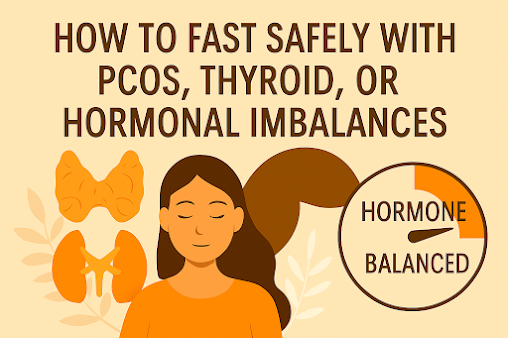Search This Blog
The Reset Ritual is your go-to blog for mindful intermittent fasting, wellness tips, and sustainable lifestyle inspiration. Whether you're exploring the 16:8 method, aiming for weight loss, or simply seeking more energy and clarity, we share beginner-friendly guides, science-backed insights, and printable tools to help you reset your body, calm your mind, and thrive — not just survive — with lasting habits.
Featured
- Get link
- X
- Other Apps
How to Fast Safely with PCOS, Thyroid, and Hormonal Imbalances | The Reset Ritual
How to Fast Safely with PCOS, Thyroid, or Hormonal Imbalances
Intermittent fasting has many benefits — but if you have PCOS, thyroid issues, or other hormonal imbalances, it’s important to approach fasting with extra care. Done thoughtfully, fasting can support hormone health, metabolic function, and overall well-being.
Why Hormone Health Matters When Fasting
Your hormones regulate metabolism, energy, sleep, fertility, and stress responses. If your body is already dealing with hormonal imbalances, aggressive fasting schedules could worsen symptoms instead of helping. The good news? With a few simple tweaks, fasting can be a gentle and effective tool to balance your system naturally.
Tips for Fasting Safely with PCOS, Thyroid, or Hormonal Concerns
- Start Slow: Begin with a 12:12 fasting window (12 hours fasting, 12 hours eating) before moving to 14:10 or 16:8 patterns if tolerated well.
- Prioritize Nourishment: Break your fasts with whole foods rich in protein, healthy fats, and fiber — think eggs, salmon, avocado, leafy greens, and berries.
- Manage Stress: Chronic stress raises cortisol levels, which can disrupt thyroid function and worsen PCOS symptoms. Pair fasting with mindfulness, deep breathing, and gentle movement.
- Don’t Overfast: Extended fasts (24+ hours) may not be ideal for women with hormonal imbalances unless under supervision. Consistency with moderate fasting windows is often more beneficial.
- Support Your Thyroid: Ensure adequate intake of iodine, selenium, and zinc through food or supplements to support thyroid hormone production.
- Hydrate and Replenish Electrolytes: Especially important for hormone balance! Consider adding an electrolyte powder supplement during fasting windows.
Supplements That May Support Hormone-Friendly Fasting
- Magnesium glycinate — promotes relaxation and hormone balance
- Collagen peptides — support skin, joints, and gut health post-fast
- Ashwagandha — adaptogen to balance cortisol and support thyroid health
Final Thoughts
Fasting can be an empowering tool for women managing PCOS, thyroid conditions, or other hormonal challenges — but listening to your body is key. Start slowly, fuel yourself well, manage stress, and celebrate small improvements over time!
💡 Share this post with someone who wants to try intermittent fasting!
And don’t forget to tag @TheResetRitual if you're sharing your journey 🧘♀️💬
Disclaimer: This article is for informational purposes only and is not medical advice. Always consult with your healthcare provider before making changes to your diet, fasting routine, or lifestyle. This post may contain affiliate links. As an Amazon Associate, I earn from qualifying purchases.
- Get link
- X
- Other Apps
Popular Posts
Best Foods to Eat After a Long Fast: Refeeding Safely | The Reset Ritual
- Get link
- X
- Other Apps
How Long Should You Fast? Short vs. Extended Fasting Explained | The Reset Ritual
- Get link
- X
- Other Apps



Comments
Post a Comment